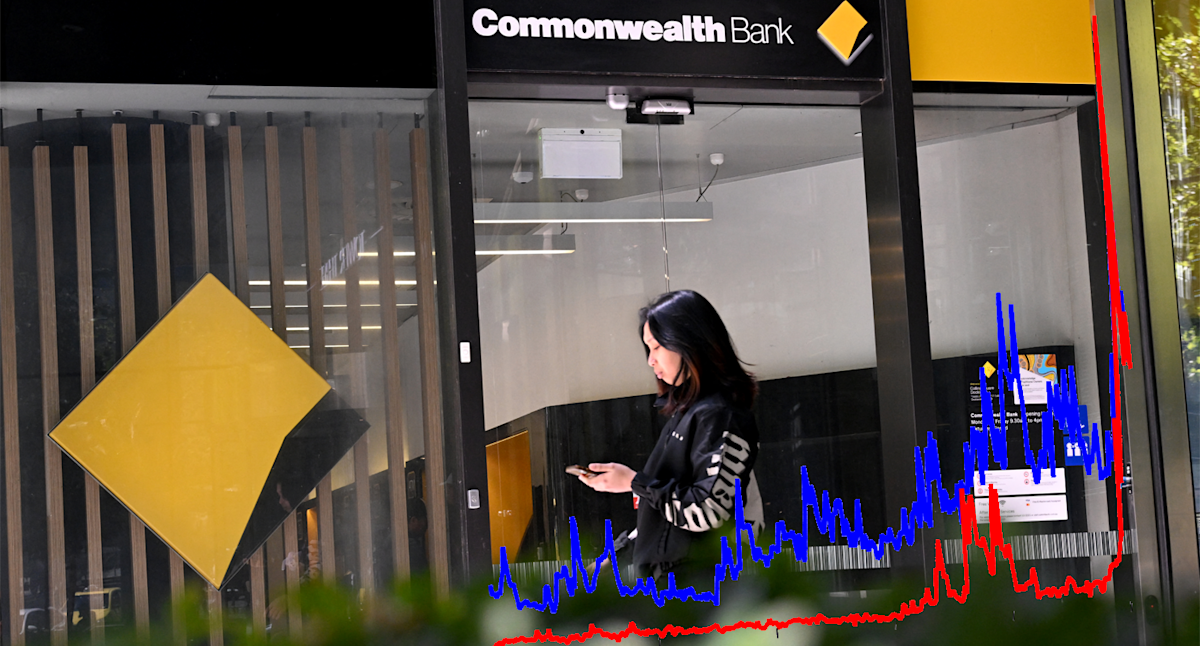The shift is a ‘net negative for global growth and productivity’ the CBA economist warned.(Source: Getty)
Australia and the world are facing “a new economic era” as a breakdown in trust among key countries has led to a surge in policy uncertainty and a quiet unease in international markets. That is the ominous assessment by the chief economist at Australia’s largest bank who says the new norm is here to stay.
And it potentially means lower productivity and higher interest rates, he warned.
“We have entered a new economic era, one with rules that are very different to the last,” Commonwealth Bank economist Luke Yeaman wrote in a note to investors on Wednesday.
“Economic security now trumps economic efficiency.”
Economist Richard Denniss from the Australia Institute told Yahoo Finance that “there’s no doubt we’re in a new phase” for global relations and markets.
RELATED
He noted that countries have always maintained trade barriers and protectionist policies. “There was never really a free trade era. There was a freer trade era … but that’s over,” he said.
“I think that raises big challenges for Australia, because rhetorically, we still kind of talk as if the free trade era is with us, and economically we’re not as good at making sure that Australians get value out of Australian production. We’ve just hitched ourselves to that kind of free trade wagon, and it served us well when we got security from the US and prosperity from China, but now the world’s more complicated.”
China and the US are leading the global economy into a ‘new era’. (Source: Yahoo Finance Australia)
The CBA note – titled Fasten your Seatbelt: Making sense of a new economic era – warned the prevailing factors could work against the lowering of interest rates.
“This new era will see sustained higher levels of economic and market volatility, greater domestic investment, add structural pressure to government budgets, and drive more government intervention in the economy, creating bifurcated markets,” the CBA economist wrote.
“Overall, these changes are a net negative for global growth and productivity, reversing some of the gains we saw during the era of globalisation.
“They will also put upward pressure on neutral interest rates.”
The Commbank economist cited the large spike in policy uncertainty and specifically trade policy uncertainty in the past 12 months to argue that markets appeared to be underestimating the potential of further shocks in a world increasingly dominated by geopolitics.
Story Continues
Policy and trade uncertainty has spiked since Donald Trump returned to the White House. (Source: CommBank)
While the whims of Donald Trump have exacerbated the shifting outlook on international trade, it’s a change that will outlast him as China tries to reorient the global economy more in its favour.
What is taking place is a lasting shift, Yeaman wrote, warning investors that they were likely wrong to look through it.
“This is a deep structural change, not a temporary Trump phenomenon — as some would like to think.
“Investors shouldn’t lose sight of the fact that there is a far bigger game at play here that goes well beyond a standard trade negotiation. This is a long fight for strategic power; it is not primarily about short-term economics.”
The thing that could help save global markets in the near term, Yeaman noted, is the ongoing investment in the AI boom and the continued push to net zero emissions.
Richard Denniss, who is the executive director of the left-leaning Australia Institute told Yahoo Finance that for the everyday investor, the most actionable thing they could do was to use their vote at the ballot box to try shape foreign policy that is less about “picking teams” and focused on pursuing strong relationships with trading partners.
“I think the world is a more uncertain place at the moment. There’s not much an individual Australian investor can do about that,” he said.
“But it’s in the banks and the big money manager’s interests to tell everybody how volatile and risky it all is, because what they’re really saying is: ‘don’t go it alone. Trust us to manage your money’.”
At the end of the day, “no one knows what’s going to happen,” he said.
Amid the shifting sands of global relations, Australia is being urged to establish a regional intelligence sharing alliance with New Zealand, Papua New Guinea and Fiji to counter mounting threats our region.
Australia currently has the ‘Five Eyes’ partnership between Australia, New Zealand, Canada, the United States and the United Kingdom. But overall, when it comes to the Pacific region the status quo of patchwork agreements had failed to tackle transnational crime, illegal fishing, disaster response, climate-related security, and cybersecurity issues, according to Lowy Institute’s Pacific islands program director Mihai Sora.
“These vulnerabilities create space for external actors, above all China, to gain leverage in the Pacific Islands,” he said said in a policy brief released on Wednesday.
Australia has been working to block China out of the region by signing security deals, including with Nauru and Papua New Guinea.
Meanwhile Beijing has made “unprecedented inroads” and its secretive security pact with the Solomon Islands has raised fears of a Chinese military presence in the Pacific, Mr Sora said.
with AAP
Get the latest Yahoo Finance news – follow us on Facebook, LinkedIn and Instagram.

